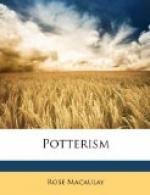The Daily Haste, of course (and, to do it justice, many other papers), used the word freely as meaning the desire for better conditions and belief in the strike as a legitimate means of obtaining them. I suppose it took a shorter time to say or write than this does; anyhow, it bore a large, vague, Potterish meaning that was irresistible to people in general.
The Haste made such a fool of itself over the miners that we came to blows with them, and quarrelled all through July and August, mostly over trivial and petty points. I may add that the Fact was not supporting immediate nationalisation; we were against it, for reasons that it would be too tedious to explain here. (As a matter of fact, I know that all I record of this so recent history is too tedious; I do not seem to be able to avoid most of it; but even I draw the line somewhere). The controversy between the Fact and the Haste seemed after a time to resolve itself largely into a personal quarrel between Hobart and myself. He was annoyed that Jane occasionally wrote for us. I suppose it was natural that he should be annoyed. And he didn’t like her to frequent the 1917 Club, to which a lot of us belonged. Jane often lunched there, so did I. She said that you got a better lunch there than at the Women’s University Club. Not much better, but still, better. You also met more people you wanted to meet, as well as more people you didn’t. We started a sort of informal lunch club, which met there and lunched together on Thursdays. It consisted of Jane, Katherine Varick, Juke, Peacock, Johnny Potter, and myself. Often other people joined us by invitation; my sister Rosalind and her husband, any girl Johnny Potter was for the moment in love with, and friends of Peacock’s, Juke’s, or mine. Juke would sometimes bring a parson in; this was rather widening for us, I think, and I dare say for the parson too. To Juke it was part of the enterprise of un-Potterising the Church, which was on his mind a good deal. He said it needed un-Potterising as much as the State, or literature, or journalism, or even the drama, and that Potterism in it was even more dangerous than in these. So, when he could, he induced parsons to join the Anti-Potter League.




